Circulation Policies, Configuration
General
How does Alma support circulation functions on the institution and library level?
Alma’s basic design is based on two organizational levels, the Institution and the Library:
- The Institution is the basic level of data and workflow management in Alma; it also holds all of the institution, or local library, data. Some processes and configurations, however, may be managed at the Library level.
- The Library is one or more physical locations that are normally housed in a single building or in several buildings that are in close proximity to one another. It has locations and circulation desks that are familiar to the library patrons.
Fulfillment relationships define the services that one library is able to perform for another library within the same institution. The service options are:
- Deliver to (available on the library level only) – The library being configured can deliver resource sharing items for patron pickup to the specified library.
- Circulate for (available on the library level only) – The library being configured can check in and check out items for the specified library.
- Acquire for (available on both the library and institution levels) – The library or institution being configured can acquire items for the specified library.
- Supply from (available on the resource sharing library level only) – The resource sharing library being configured supplies items for resource sharing that come from the specified library.
Selecting All for any of these service options indicates that the library/institution being configured can provide the service for all libraries or receive the service from all libraries in the institution. If All is selected for a service but an individual library has a different value, the library’s selection will take precedence.
You configure fulfillment relationships on the Organizational Units Relationships Setup page. Each circulation desk is associated with a library and serves particular locations in that library.
Loan rules
How are loan rules defined in Alma?
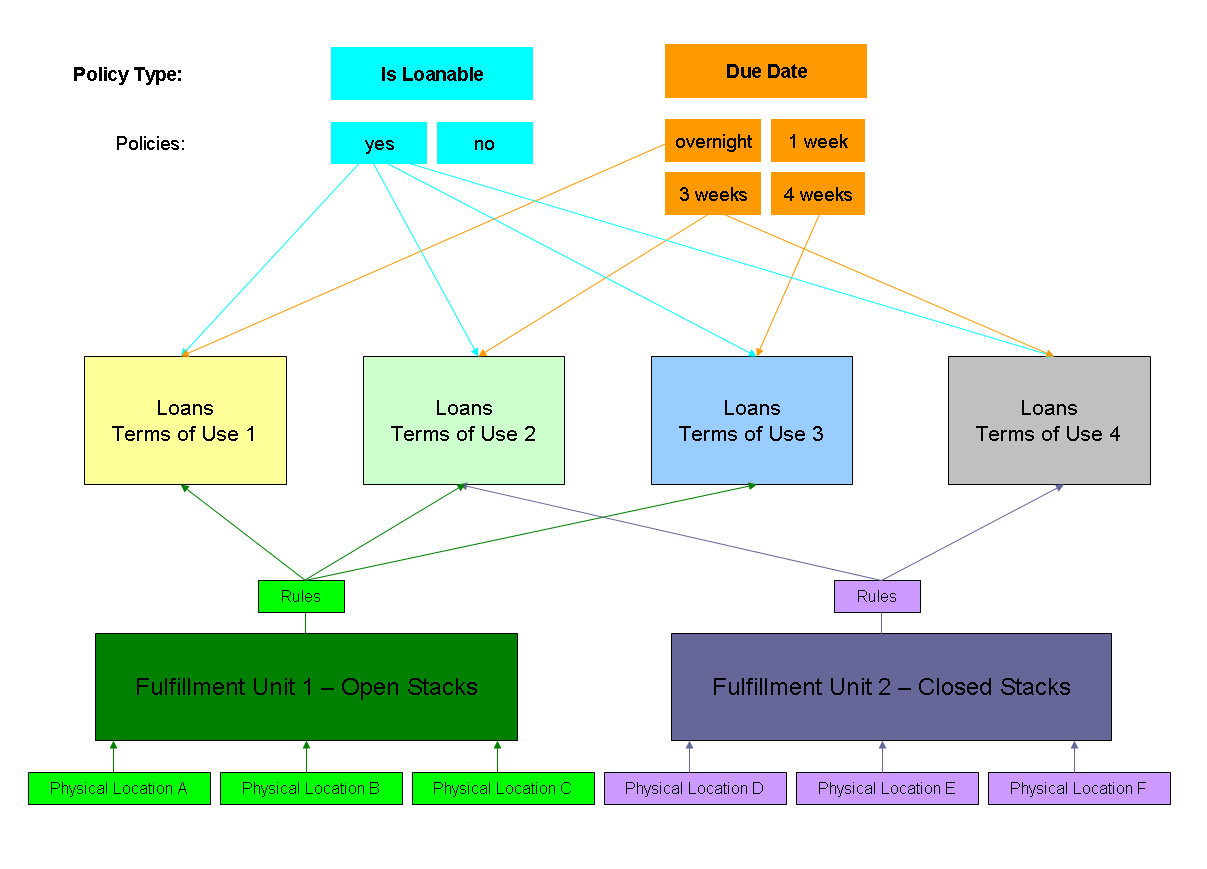
How are policies (Terms of Use) defined in Alma?
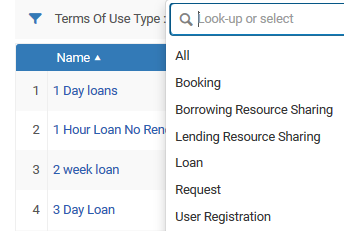
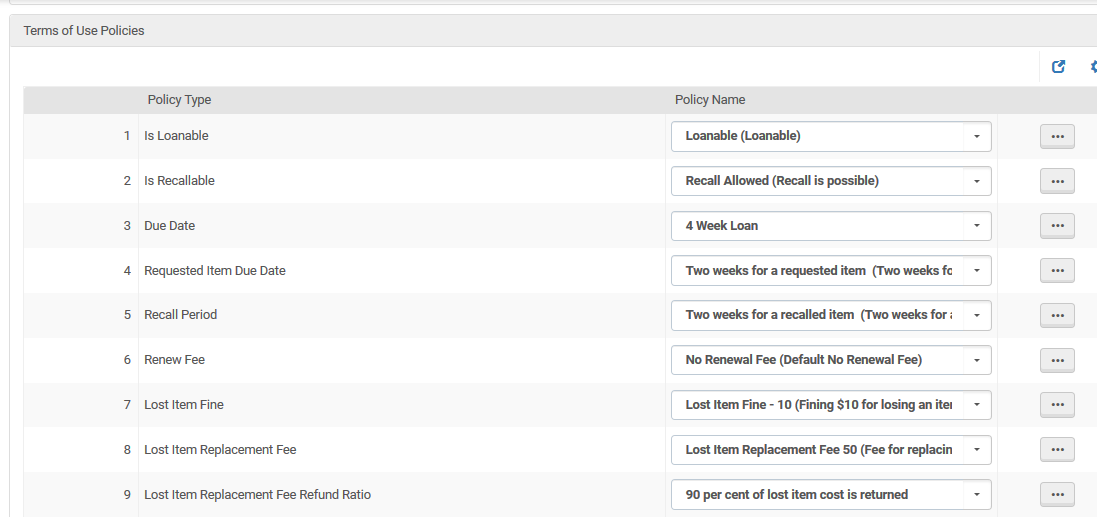

What are Fulfillment Units in Alma?
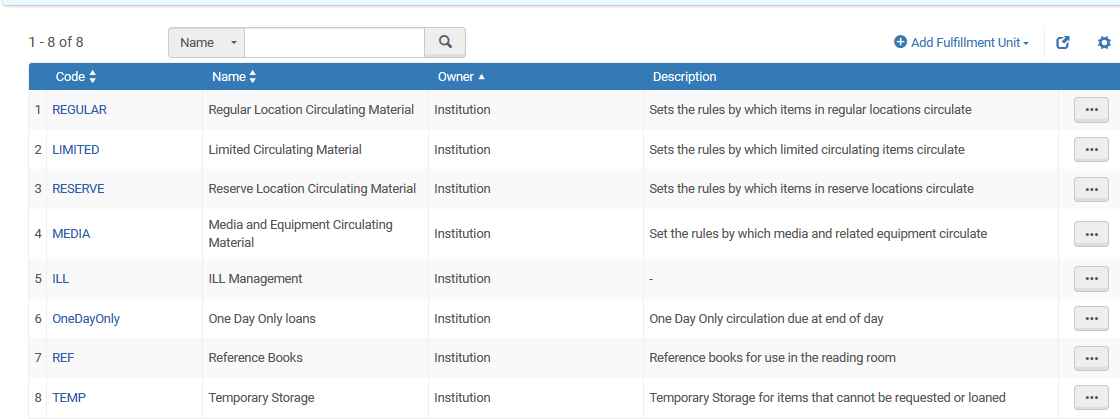
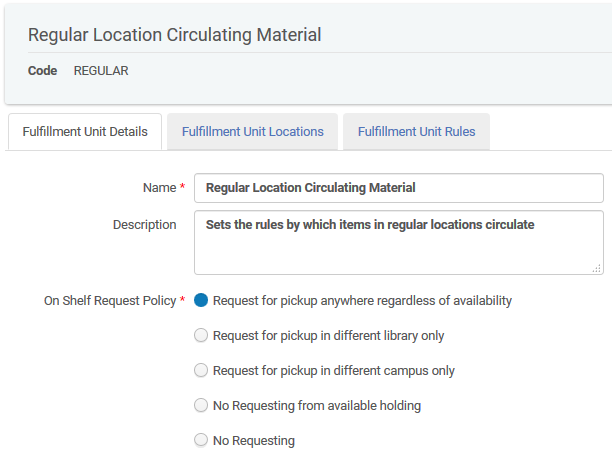
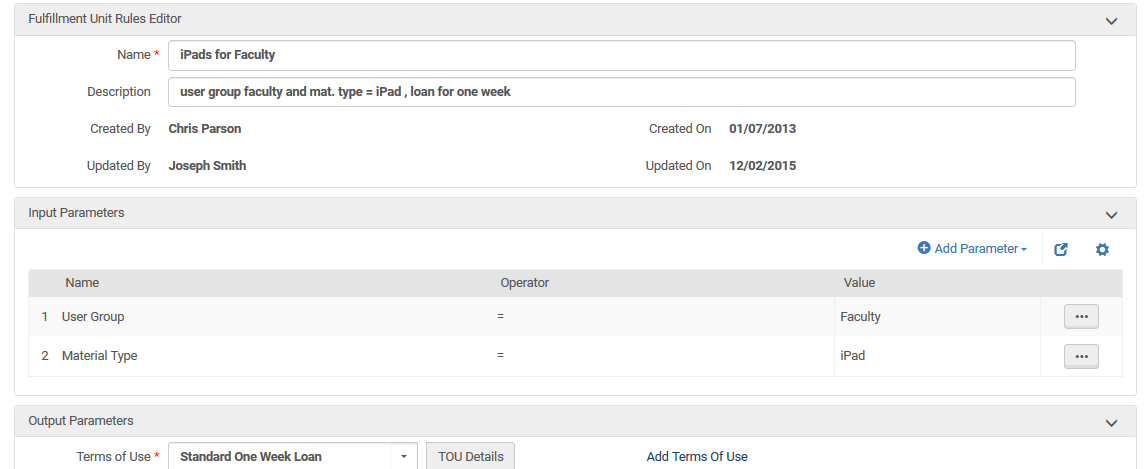
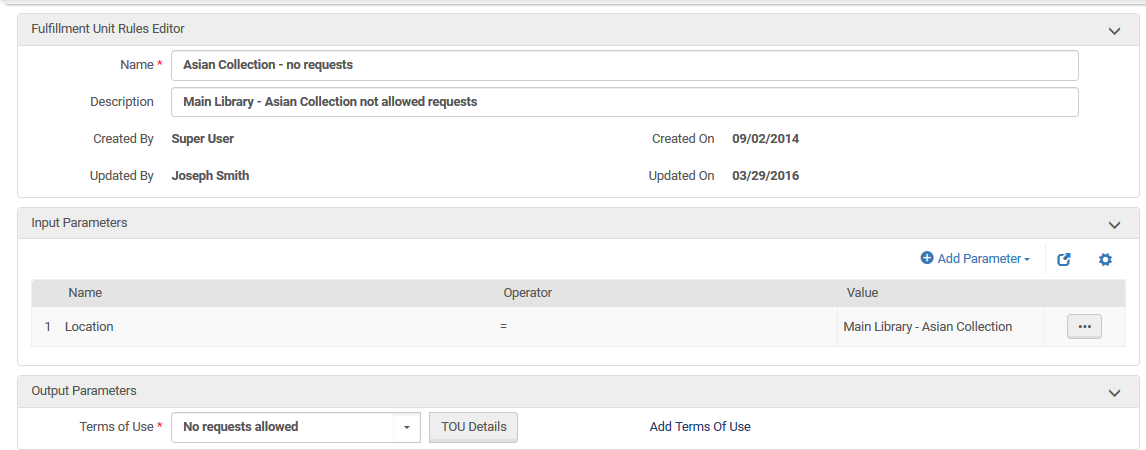

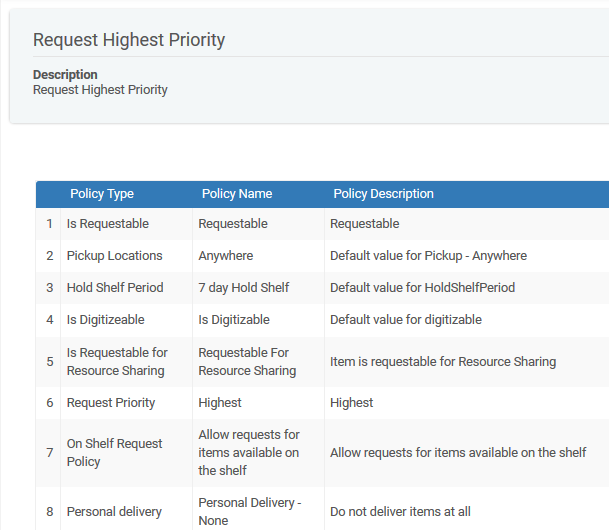
How can lending rules be reviewed?
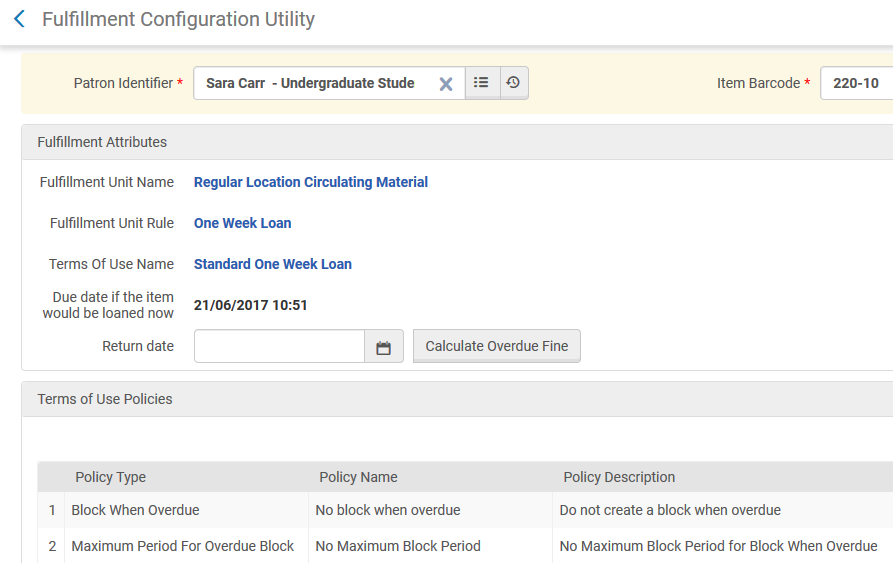
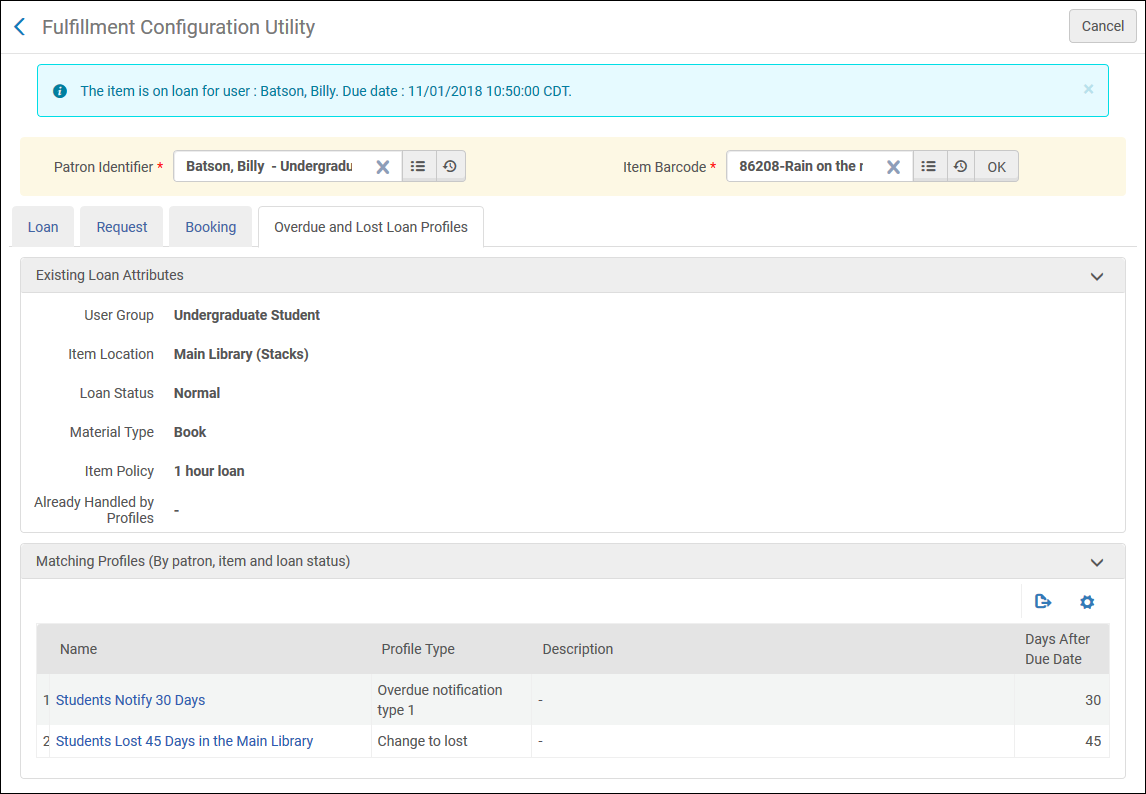
How are overnight loans in Alma handled?
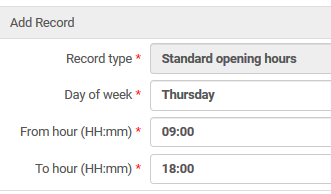

Can a patron be blocked from reloaning an item that they have just returned?
You can configure a re-loan limit, preventing patrons from re-loaning items that they have just returned. A policy type, Reloan Limit, in the Loans Terms of Use table controls this:
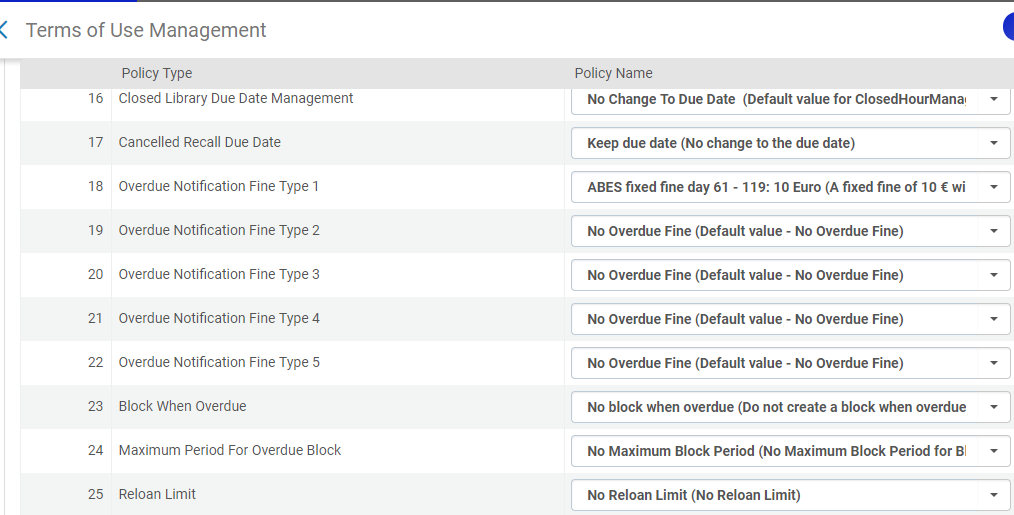
The policy type has three possible options:
- None – There is no limit on borrowing copies of the same title. This is the prior functionality and the default.
- Parallel – The patron may not check out two copies of the title at one time.
- Other – You may define the time span (in the Unit of Measurement) in which the same item may not be re-loaned - minutes, hours, days, weeks, or months.

A different copy of the same title with the same material type is considered as a single item for this policy.
Does Alma support the concept of grace periods?

Does Alma support postal loans to specified groups?

Can Alma suppress late notices or bills for certain types of materials?
This can be achieved by defining an Overdue and Lost Loan Profile. The profile allows for defining a policy based on parameters such as user group, loan status, location, library material type and more as can be seen in the following screen capture. If the flag 'Send notification' is not checked, overdue and billing notices will not be sent.
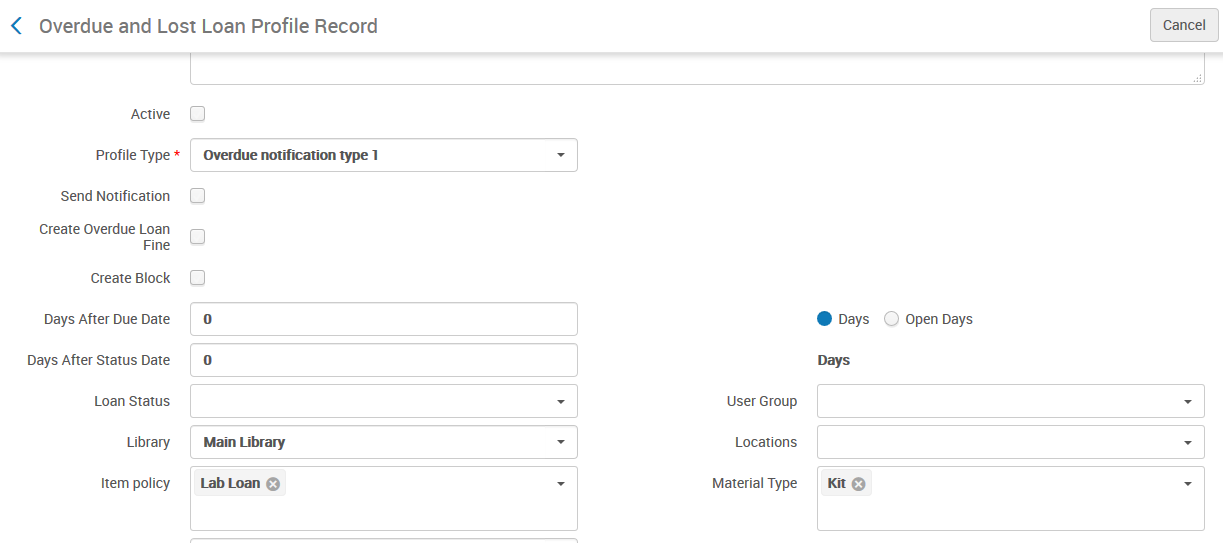
What flexibility does Alma offer for defining pickup locations for requested items?
-
Request for pickup anywhere regardless of availability – All pickup locations that are allowed according to the Pickup Locations policy are available, regardless of whether the item is on the shelf
-
Request for pickup in different library only – Removes the owning library from the list of available library pickup locations
-
Request for pickup in different campus only – Removes the owning campus from the list of available campus pickup locations
-
No requesting from available holdings – If an item from the holdings is available, all items from this holdings may not be requested for pickup at any pickup location. All items from other holdings are not impacted.
-
No requesting – If an item attached to this rule is available, it may not be requested for pickup at any pickup location.
Due dates
Can due dates be defined/calculated based on patron type, item type and location?
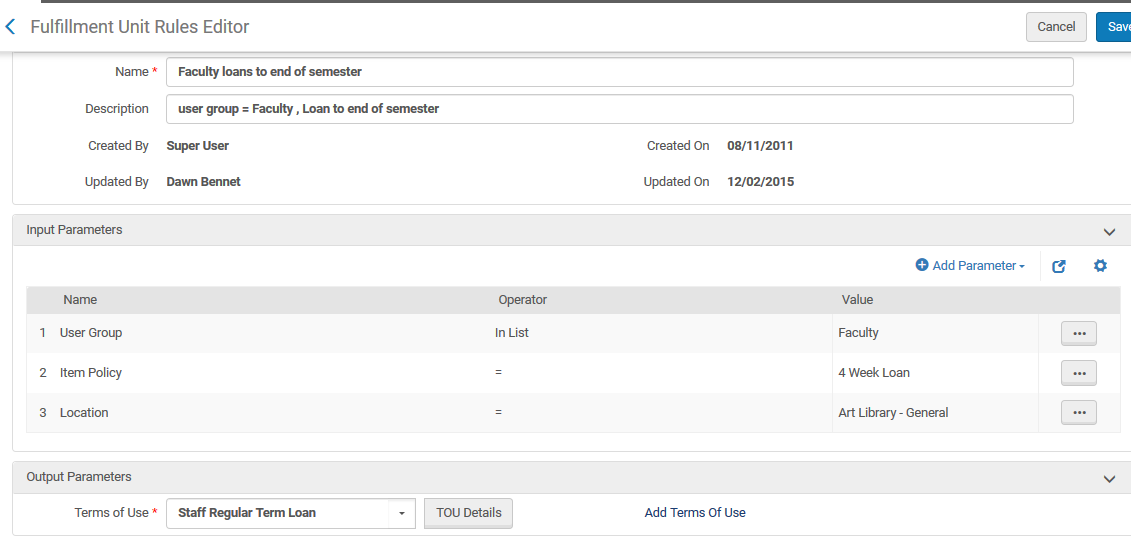
How would the due date of hourly loans be calculated if the library is open 24/7?
Limits
Can the library define loan limits - e.g. by material type and/or patron group?
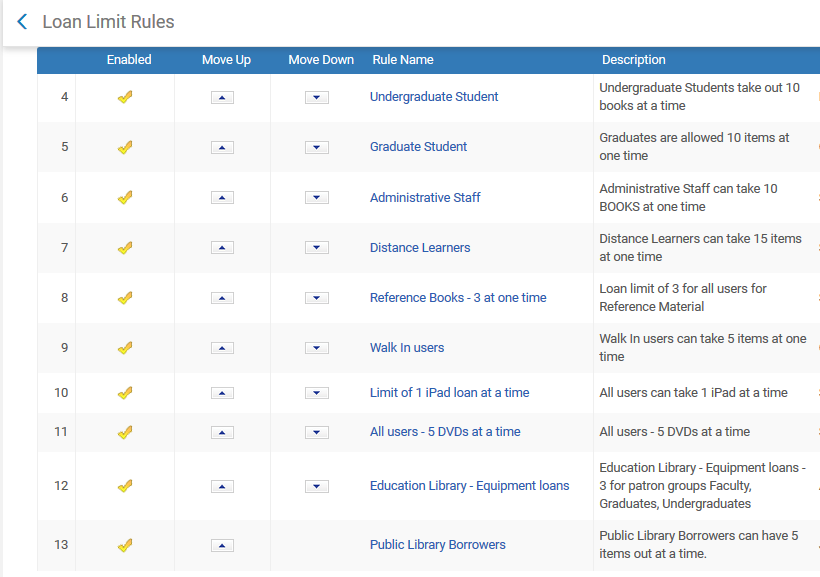
What options are available for allowing staff to override system limits?
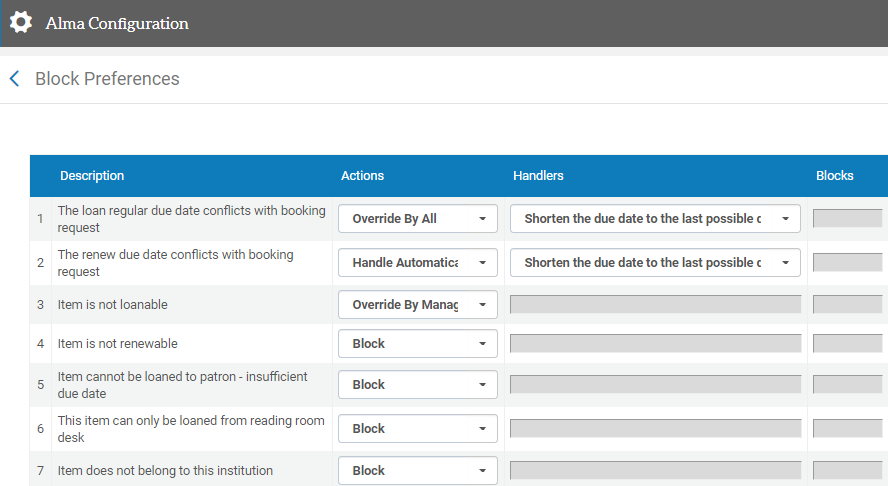


Can a limit be placed on the number of requests that a patron can have at one time?
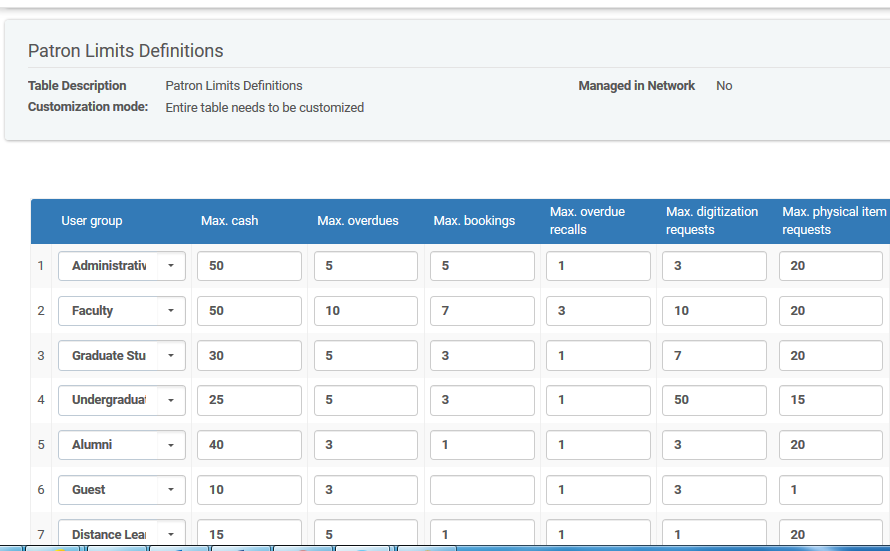
Can a re-loan limit be defined?
Alma supports the option of defining a re-loan limit , preventing patrons from re-loaning items that they have just returned. A different copy of the same title with the same material type is considered as a single item for this policy. The policy type has three possible options:
- None – There is no limit on borrowing copies of the same title.
- Parallel – The patron may not check out two copies of the title at one time.
- Other – You may define the time span (in the Unit of Measurement) in which the same item may not be re-loaned - minutes, hours, days, weeks, or months.
Transit rules
Can transit times between libraries be configured?
Transit time rules enable Alma to calculate the feasibility and expected delivery times for fulfillment requests. When an item request is received, the fulfillment transit time rules are checked to determine the expected transit time based on the location of the item requested, the pickup location and, in some cases, the material type of the item (for example, moving an oversized item from one library to another may take longer than moving an average-sized item).
There is a default transit time rule that defines the delivery time when none of the transit time rules is met. This default rule can be modified, but out-of-the-box it is set to a 12-hour delivery time.
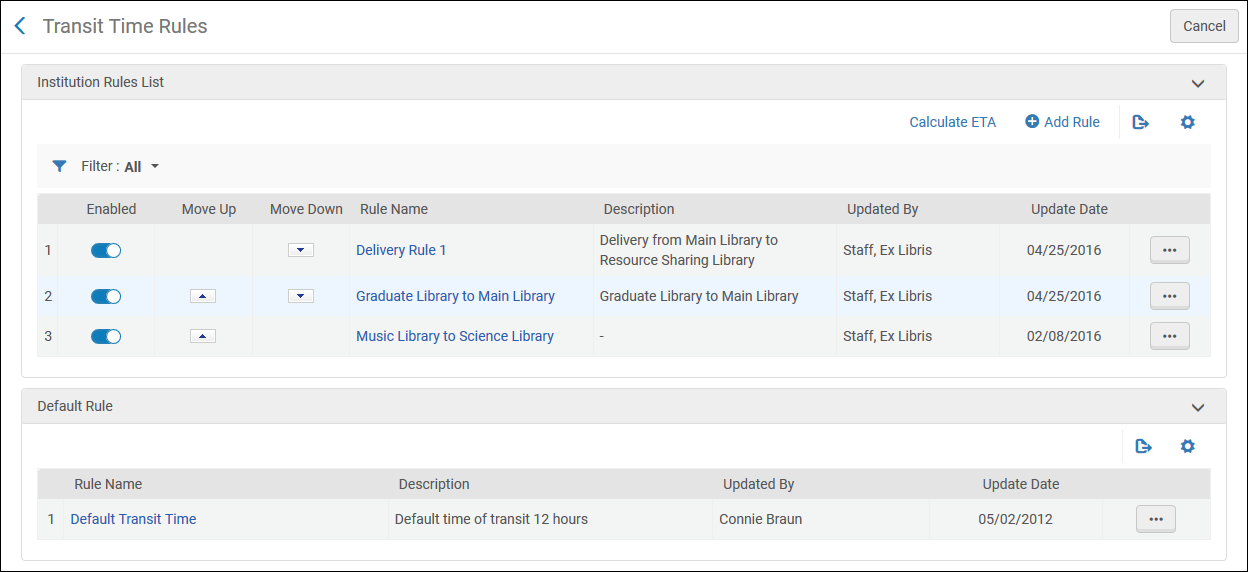
When you define a new transit time rule, you can test the rule by calculating the estimated time of arrival (ETA) for a scenario in which the rule is applied.
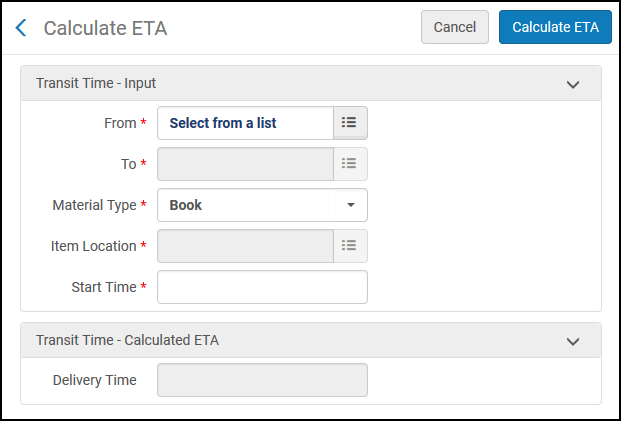
Transit time rules can be configured at the institution level only.
Can reshelving rules be configured without transit rules?
You can now relation rules between libraries so that transit for reshelving will not be required between certain libraries, departments, and circulation desks. This reduces redundant work effort by not automatically putting items in transit for reshelving when the libraries are close to each other. This does not affect other transit types, such as hold shelf, work order, and processing.
You configure these rules from the Reshelve Without Transit Rules page (Configuration Menu > Fulfillment > Library Management > Reshelve Without Transit Rules).
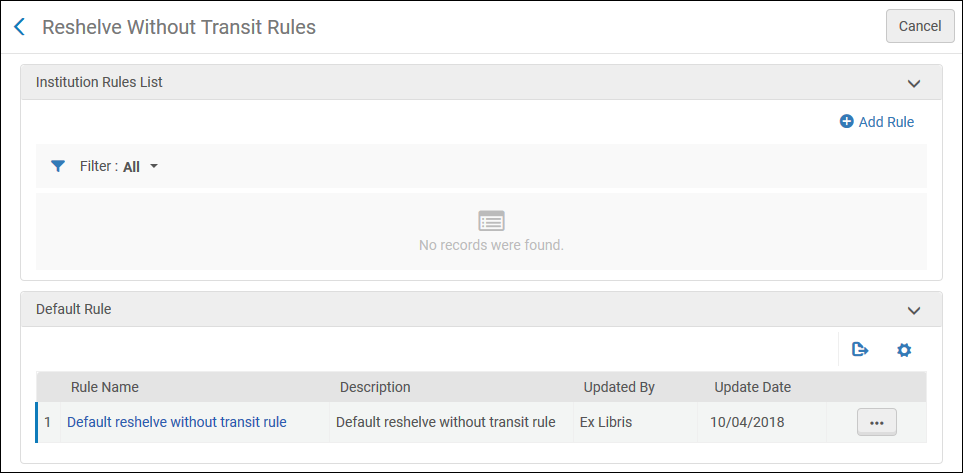
Blocks
What configuration options are available related to blocking patrons?
In depth configuration is possible through user block definitions. You must first configure user block descriptions (you must select a description when configuring a definition).
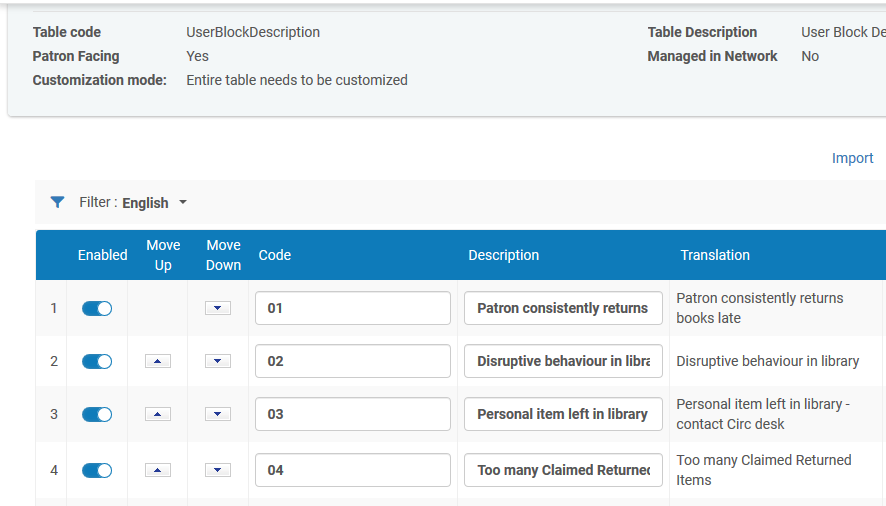
User block descriptions also appear in the drop-down list when blocking a user.
The following parameters can be configured for block definitions:
- Description – Describes the block action; the reason for the block. This list includes all of your user block descriptions.
- Blocked action – Select the blocked action from one of the following (These blocked actions are preconfigured in Alma:
- 01 – loan
- 02 – loan, renew
- 03 – loan, renew, hold
- Type – Select the type of block from one of the following:
- Cash
- Demerit
- General
- Loan
- Resource sharing requests
- User
The Type value is for information only and does not impact the system, with the exception of the Demerit type. Alma allows you to configure a demerit system that applies patron blocks (such as for loans) based on the number of demerits a user has accrued within a configured amount of time. Once a block is applied, the institution suspends the user for the configured number of days and subtracts the used demerit points from the user's record. If the user receives more demerit points while on suspension, these points and the user's remaining points may contribute to another suspension once the previous suspension period ends.
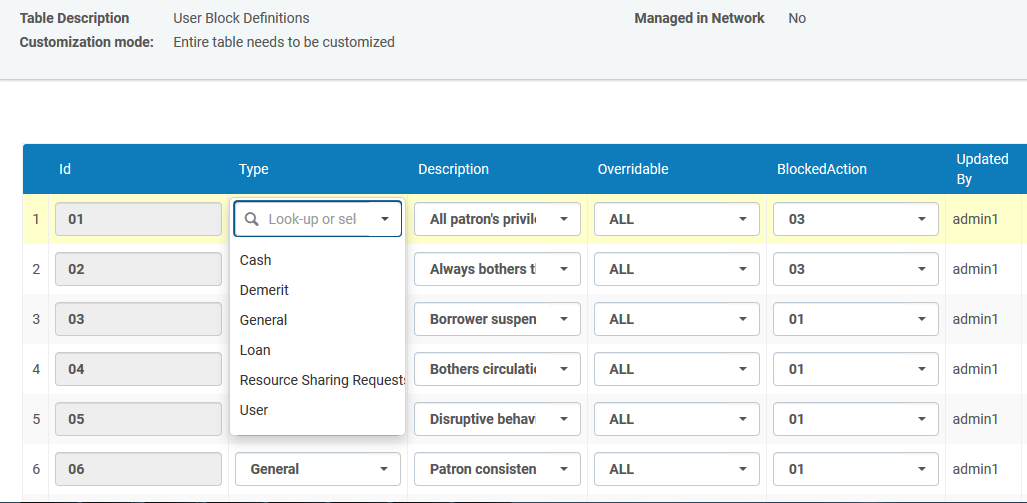
- Overridable – Select whether the block is overridable from one of the following:
- ALL – The block is overridable by any circulation desk operator
- NONE – The block is not overridable
- CIRCDESC – The block is overridable only by a circulation desk manager
- OPERATOR – The block is overridable by a circulation desk manager or a circulation desk operator (and not a user with circulation desk operator – limited permissions)

What blocking options are available in Alma?

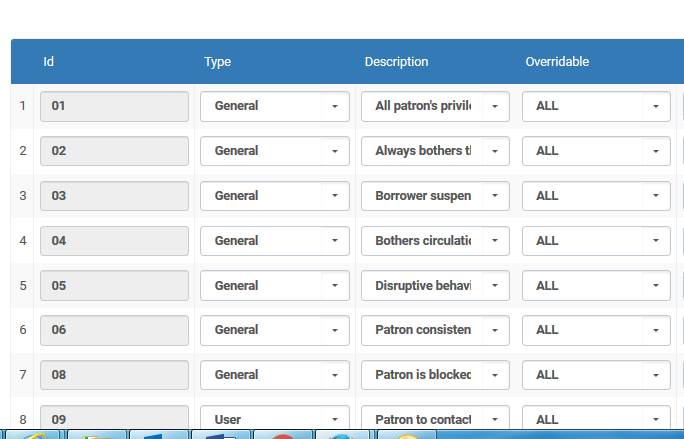

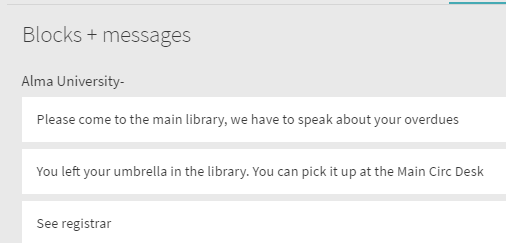
Can block preferences be configured?
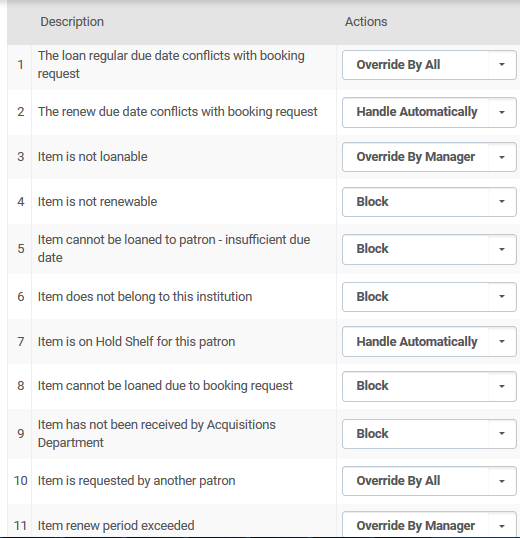
Can a patron be blocked if items on loan are returned late?

Overdues
Can Alma process overdue loans into lost items after a library-determined amount of time, and based on item type and patron group?
Total views:
23144
